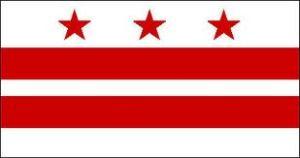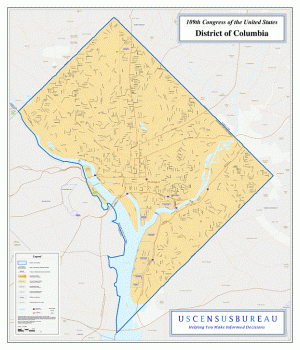The District of Columbia city council moved another step closer to decriminalizing marijuana possession in the nation's capital Tuesday, approving a bill to do just that on an 11-1 vote. But it only acted after approving last-minute amendments that would make public pot-smoking a criminal offense and give police the right to conduct vehicle searches if they smell marijuana.

While advocates greeted the council vote with praise, the accolades were tempered by concerns about the council's adoption of the late amendments. And looming over it all is the prospect of outright legalization in the District, either through a bill introduced by Councilmember David Grasso that is now before the council or through an initiative that is now awaiting language approval from District officials.
"This is a major victory for advancing the cause of racial justice in DC," said Grant Smith, policy manager with the Drug Policy Alliance. "The war on marijuana is largely a war on people of color and the DC council is saying enough is enough."
"As a former prosecuting attorney, I call this a step forward for the cause of promoting public safety," said Dan Riffle, director of federal policies for the Marijuana Policy Project (MPP). "Arresting and prosecuting adults for possessing a less harmful substance than alcohol is a waste of law enforcement and court resources. Police and prosecutors should focus their time and attention on addressing actual threats to public safety."
The "Marijuana Possession Decriminalization Amendment Act of 2014 (Council Bill 20-409)" would eliminate the threat of arrest for possessing marijuana impose a $25 civil fine for possession as well as forfeiture of the marijuana and any paraphernalia used to consume or carry it. But the amendments approved Tuesday criminalize public possession and allows those vehicle searches.
The bill was introduced after the publication of an ACLU report and a Washington Lawyers' Committee on Civil Rights and Urban Affairs report highlighting the disparate rate of arrests of blacks over whites for marijuana possession in the District. The reports found that blacks are arrested eight times as often as whites for the offense, even though rates of use among both races are thought to be relatively similar.

"These last-minute amendments will simply expand stop-and-frisk policies in the District and will do nothing to fight the horrible racial disparities in marijuana enforcement," said MPP's Riffle. "We need to regulate and tax marijuana like alcohol, and take it out of the hands of criminals and drug cartels. Marijuana should be sold by legitimate businesses in licensed, regulated stores, not by criminals on our street corners. The sooner the council takes up Councilmember Grosso's bill, the better."
The Drug Policy Alliance will be working to undo the amendments when the council takes a final vote on the bill next month, Smith told the Chronicle Tuesday night.
"There is one more opportunity to change the criminalization of public smoking when the council considers and votes one more time on the bill," he said. "We hope to work with Councilmember Tommy Wells and our community partners here in DC to pressure the council to reverse its decision to criminalize public consumption and treat public smoking as a civil offense instead."
Looming just behind the decriminalization fight is outright legalization. Public opinion in the District appears ready to make the leap. A Washington Post poll last year had support for legalization at a healthy 63%.
While some groups, like the Marijuana Policy Project, are working the council in an effort to move a bill, others favor the initiative process, especially if the council fails to act.
"As a DC resident, I'm proud the Council took an important step today to stop the expensive, time-consuming and racially discriminatory practice of putting people into handcuffs just for possessing marijuana," said Tom Angell of Marijuana Majority."But while this is clearly movement in the right direction, this legislation would unfortunately leave marijuana production and profits illegal and largely in the hands of street gangs and criminals. A clear majority of District voters supports legalizing marijuana, and that's why we're likely to approve a ballot initiative this November that would completely remove penalties for possession and allow residents to grow up to six plants. Hopefully such widespread voter support will spur the council to adopt more comprehensive legislation taxing and regulating the marijuana trade at some point soon."
Adam Eidinger of the DC Cannabis Campaign is the public face of the DC marijuana legalization initiative. The veteran District political gadfly had kind words for the decriminalization effort, but signaled it wouldn't make any difference to the initiative campaign.
"The compromise on the decrim bill wasn't that bad. The big deal is that it passed, and it passed with a veto-proof majority, and the mayor will sign it. We should be celebrating," he said, "But I'm on the war path. Decriminalization is a stepping stone toward ending the raging stream of marijuana arrests; it's a nice place to stand, but you don't want to live there, because you're going to fall in the water eventually. And I mean get arrested," he clarified.
"Look, decriminalization will get rid of a lot of arrests, but there will still be marijuana arrests and people engaging in illegal activity when they want to buy it," Eidinger continued. "And they're exposed to heroin and other hard drugs. You need to separate cannabis from all the hard drugs and create a legal cultivation and distribution system. That hurts the bulk hard drug dealers. If you care about reducing drug use and addiction, you create a massive harm reduction with marijuana legalization first. I don't have sympathy for the illicit market for heroin, but for the illicit cannabis market, it's not deadly."
The legalization initiative campaign continues to aim at the November ballot, Eidinger said, but still needs to secure funding if it's going to be successful. A key date for the initiative will be February 25, when the DC Board of Elections decides whether to approve the initiative language for signature-gathering.
"If the language is good, that's a big deal," Eidinger said. "I think some of the big money has been holding off until that happens. We're doing this on a shoe string and have raised $30,000 in six months, but we do have the money for signature-gathering locked in, thanks to Dr. Bronner's Magic Soaps. We will do paid and volunteer signature-gathering."
Marijuana law reform is coming to the District of Columbia. And the decriminalization bill is only the beginning.
Comments
Will the real drug reformers please stand up
That "free the herb but lock up all the junkies" mantra spewed by so-called drug reformers like Adam Eidinger is pathetic. The fact that illicit heroin causes fatalities like that of Philip Seymour Hoffman is all the more reason to legalize the drug, so purity can be strictly controlled. When heroin is administered in a clinical setting overdoses are rare and never fatal.
Add new comment